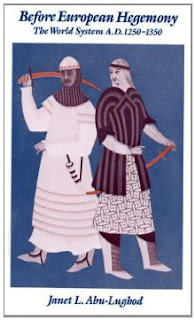In her 1989 book Before European Hegemony: The World System, A.D. 1250-1350, Janet Abu-Lughod provides an interesting pre-history to the “European” world-system analyzed by Wallerstein . According to her the latter system arose as a kind of transformative take-over of an earlier system that was already in existence although it had been declining since the mid-14th century. This was not a system centred on Europe. It had several cores, but its most important center was in China. Her analysis therefore works as a criticism of Wallerstein’s at least tendential Eurocentrism (but only partly, because she is a bit Eurocentric herself, addressing a European or at least "Western" implied reader, starting the book with Europe, using Europe as a constant point of reference and sometimes curiously overvaluing Europe’s contribution to the system in a way that is inconsistent with her general thrust which is aimed at showing how peripheral Europe was).
Although this early system was not "capitalist" in Wallerstein's sense (he stresses systematic “endless accumulation” in his definition of capitalism rather than the kind of long-distance trade that Abu-Lughod describes), Abu-Lughod makes it clear that this was an important predecessor system of the properly capitalist system that emerged in the 16th century. It was in this early system that the important trade routes were established, as well as much of the productive activity and the institutions necessary for trade.
As for particular geographical areas, I liked the analyses of the Italian city states as well as the analysis of Srivijaya and its relation to China. It was also interesting to see how much emphasis she puts on factors like the Black Death in explaining the decline of the system after the mid-14th century. The decisive factor behind this decline, however, was the disruption or closing of China’s two trade routes to the west - first the landbased route across Asia (the “silk road”) after the collapse of the Mongol empire and later the seabased route when the Chinese economy no longer allowed the Ming to send navies into the Indian Ocean. “When both of these lines to the world system were open, China flourished; when they closed, China declined, and, with her, the rest of the world system” (p.258).
According to her, these developments were also of enormous importance in accounting for the rise of the new Eurocentered world system. No technological superiority was needed for the latter. “When, after 1435, the Ming dynasty withdrew a powerful Chinese fleet from the ocean… an enormous vacuum of power was created that, some 70 years later, the Portuguese intruders filled with their own brute fire power” (p. 259). So, Abu-Lughod asks, did the West rise or the East fall? She argues that “the East had already substantially ‘fallen’ before the Portuguese men-of-war appeared in the Indian Ocean. That weakened world was a plum ripe for the taking. No special ‘virtue’ inhered in the conquerors; they took control of the remnants of a preexisting world system, one they then ruthlessly honed to serve their own ends” (p.260).
A noteworthy point here is the prominent use Abu-Lughod makes of the notion of an emptiness or vacuum that can be "filled" as an explanans. This is a way of explaining things that is quite usual in everyday thought, but which hasn't been given much attention in scholarly thought (although Ahrne & Papakostas discusses it at length in one of their books). Braudel appears rather fond of the argument, as when he discusses the success of Mycenae or the Phoenicians, speculating that they were able to "fill a void" in the Mediterrenean. What is perhaps especially intriguing with this kind of explanation is that it suggests a state of very radical unpredictability. A void can be filled by almost anything. A void is a cause that at the same time accentuates contingency. If we accept, for instance, that a "void" reigned in the Indian Ocean in the 15th century then that means that whatever direction history took from then on was underdetermined, i.e. that it could just as well have developed in a completely different direction. If the Portuguese had delayed their expansion fifty years, say, then who can tell who would have filled the void instead, and with what consequences for the world system?
Abu-Lughod, Janet L. (1989) Before European Hegemony: The World System, A.D. 1250-1350, Oxford: Oxford University Press.


No comments:
Post a Comment